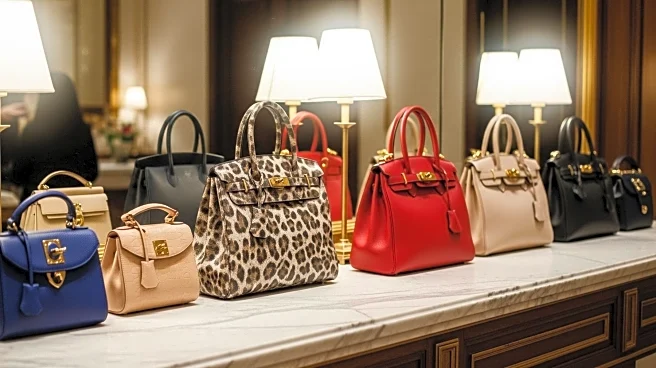What is the story about?
What's Happening?
Luxury and fashion brands are re-evaluating their marketing strategies in China due to the country's economic slowdown. This year's Qixi Valentine's Day, a major gifting occasion, saw brands like Bottega Veneta opting out of traditional campaigns. Brands are focusing on selective milestones and tactical product-driven activations rather than high-profile celebrity endorsements. Chopard, for instance, launched limited-edition dolls in collaboration with Pop Mart, while Valentino released a crossover sneaker with Vans. Chanel and Miu Miu also adapted their campaigns to reflect cultural themes rather than conventional romantic love. Louis Vuitton introduced its first makeup line in China, leveraging social media exposure. Brands are concentrating on initiatives that combine cultural relevance with measurable impact, according to Max Peiro of Re-Hub.
Why It's Important?
The shift in strategy by luxury brands highlights the impact of China's economic challenges on global markets. As brands become more selective in their campaigns, they are likely to focus on maximizing return on investment through culturally relevant and precise marketing efforts. This approach could influence how brands operate in other markets facing economic uncertainties. The emphasis on product-driven activations and cultural narratives may lead to a more sustainable and resilient business model, potentially affecting consumer behavior and brand loyalty. The changes could also impact the luxury goods market, with brands prioritizing strategic investments over expansive campaigns.
What's Next?
Brands are expected to continue refining their strategies to adapt to the evolving economic landscape in China. As they focus on cultural relevance and precision, there may be increased collaboration with local influencers and cultural consultants to enhance brand resonance. The success of these campaigns could lead to similar approaches in other regions, particularly those experiencing economic fluctuations. Additionally, brands may explore new product lines and collaborations to maintain consumer interest and engagement. The ongoing adaptation could result in a shift towards more sustainable and culturally integrated marketing practices.
Beyond the Headlines
The strategic shift by luxury brands in China may have broader implications for global marketing practices. As brands prioritize cultural relevance and precision, there could be a move towards more ethical and sustainable marketing strategies. This approach may influence how brands engage with consumers, focusing on meaningful connections rather than superficial endorsements. The emphasis on cultural narratives could also lead to a deeper understanding of consumer preferences and values, potentially driving innovation in product development and marketing techniques.















